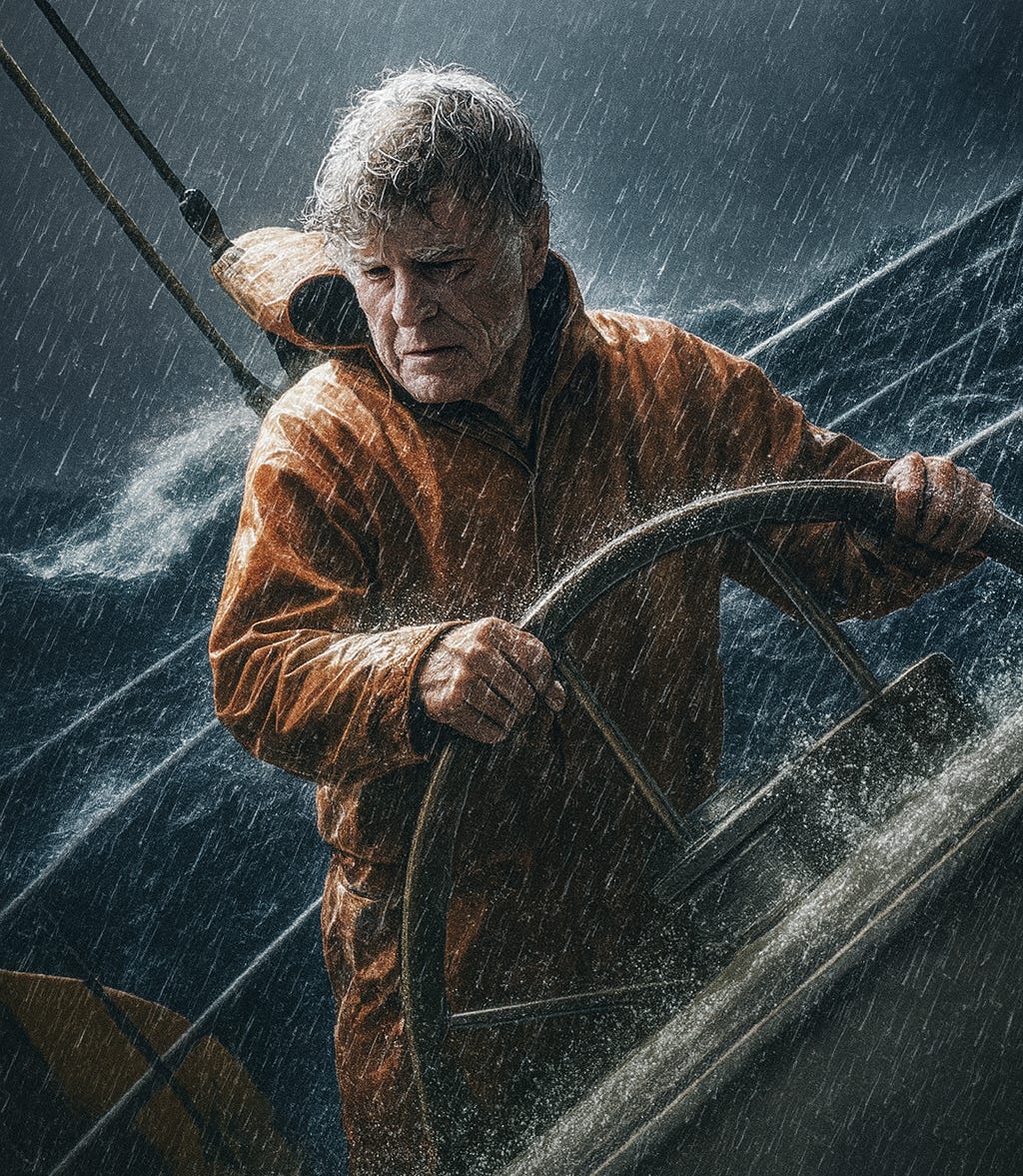Spoiler alert: If you haven’t seen Robert Redford’s 2013 film All Is Lost, I discuss the ending below.
When I first watched All Is Lost I thought I was watching a study in endurance.
The camera is tight. The sound is all saltwater on metal. In it, the late Robert Redford is a man stripped down so far he has nowhere left to hide from himself. For more than an hour, the world narrows to a raft, a sunburned forehead, a hand that will not stop looking for a rope.
The movie is almost silent. It is precise and brutal. It is about learning to stay alive when everything inside you has, without fanfare, already decided you are finished.
So I keep coming back to that raft.
Not because I want to celebrate Redford the celebrity, but because there is a scene in All Is Lost that feels like the psychic weather we live in. The man on the raft rigs a signal fire with pages torn from his journal. The fire eats his raft. He sinks. He decides it is over. He lets the sea take him. And then, underwater, he sees a searchlight. He surfaces and takes a hand. The miracle is almost bureaucratic. It is a single reaching limb. It is not cinematic fireworks. It is practical, quiet, humiliating, and complete.
That sequence reads now like an instruction manual for hope.
Despair is often less dramatic than we imagine. It is not an emblazoned collapse. It is a long, numbing narrowing. You wake up to new damage. Your charts misread the stars. The life you thought you were steering gets smashed by a container you did not see. You patch the hole. You pump. Nothing works.
You begin to catalog losses as if listing possessions will make them less real. Then you make a bad fire. You think the last page of your book is ash. You yield. The worst part is how reasonable it all becomes. You can justify giving up with the same language you used to explain your wins.
We are not at sea.
We are on a particular stretch of shore where the hunger of our politics, the casual cruelty in public life, the lowering of guardrails around basic decency, and the steady erosion of institutions have conspired to make many people feel, legitimately, like their raft is burning. Schools feel undercut. Elections feel stretched thin. Violence and fear move through neighborhoods like a weather system everyone knows is coming but no one can seem to stop. It’s the feeling of watching another school board meeting melt into a shouting match on Facebook, or realizing the library’s hours and community pantry budgets have been cut again.
I do not need to list the headlines for you to know which ones I mean. You know them. You’ve watched the photos, the clips, the threads that do not end. You have felt, more than once, that the cultural current is carrying you toward a shipping lane where nobody will see the flare.
And yet.
The film’s last gesture is not a sermon. It is a hand. The man in the water does not deliver a manifesto. He surfaces, seized by an impulse so small it barely qualifies as hope. If you’ve ever been in a room where grief has the floor, you know the moment. A coat appears around your shoulders. A cup of coffee or something stronger lands in your hands. A tissue arrives, wordless but precise. Someone passes you a stick of gum you didn’t ask for. Someone else mutters the only joke they can think of, and you laugh harder than the line deserves, because it’s the only oxygen in the room.
We still see hands like that.
They are not always official. They come from neighbors who arrive with casseroles and quiet resolve when everything else feels broken. They come from teachers who spend their own money and time so a room full of kids can have a decent day. From strangers who yank a child out of the path of an oncoming car. They are the tiny acts that shore up a community in ways headlines cannot capture.
There is another lesson here. All Is Lost insists that salvage is improvisation. The film’s protagonist is resourceful not because he is heroic in any romantic sense, but because he has to be.
He cauterizes, rigs, fashions, and repurposes. Hope, in the real world, is often the outcome of small, technical acts. It is fixing something that seems too minor to matter. It is showing up when it would have been easier not to. It is following through when the odds look ridiculous. These acts do not feel poetic when you do them, but they add up.
So write the letter. Attend the meeting. Pitch in on the thing that will take you an hour and will not be on the evening news. Teach someone how to find their way through a broken system. Replace the lightbulb in a shared hallway. Be kind to a stranger who is acting like an asshole on the bus or holding up the line at the store.
Stop romanticizing the notion that change has to arrive like a flare. Sometimes change arrives like a hand with nails bitten down and a cup of lukewarm coffee.
If you have ever felt that the raft is about to burn, know that you are not imagining it. That feeling matters. It is honest. It can be a call to action rather than a whisper to surrender. Look for the hands. Be one of the hands. And when the radio is finally fixed, and someone answers, tell them what you need.
You might be surprised at how many people are still passing through the shipping lane, staring at their own flares, and desperately hoping someone sees them.
Friends, if this is meaningful to you, please consider being a paid subscriber. Check out this great discount offer:


